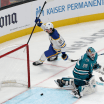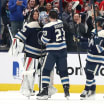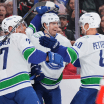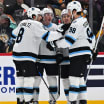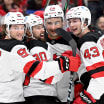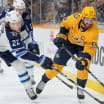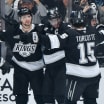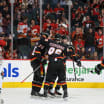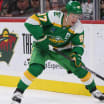NHL.com's Q&A feature called "Five Questions With …" runs every Tuesday. We talk to key figures in the game and ask them questions to gain insight into their lives, careers and the latest news.
The latest edition features Pittsburgh Penguins coach Mike Sullivan:
A 7-0-2 record in December hasn't exactly gotten the Pittsburgh Penguins the separation they would normally expect in the Metropolitan Division. Then again, the Columbus Blue Jackets have won nine in a row and still trail the New York Rangers and Penguins in the standings. The Philadelphia Flyers are fifth despite recently winning 10 in a row.
Five Questions with Mike Sullivan
Penguins coach discusses goaltending, emergence of defenseman Justin Schultz
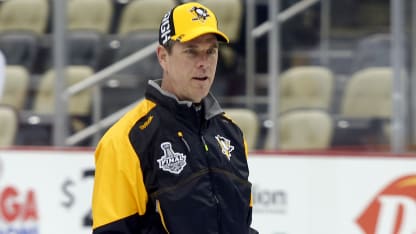
© Justin K. Aller/Getty Images
"It's hard not to [watch the standings daily]," Penguins coach Mike Sullivan said. "To see the teams in our division continue to win the way they have, it's certainly hard to ignore."
So Sullivan and the Penguins don't even try. But the defending Stanley Cup champions, who have outscored the opposition 40-20 in nine games this month, try not to dwell on what they can't control.
"Our main focus and our main priority is really on trying to control our own locker room and our own team and the circumstances surrounding it," Sullivan said. "We're trying to stay focused on the task at hand, and that's that one game in front of us."
That would be Tuesday, when they face the Rangers at PPG Paints Arena (7 p.m. ET; ROOT, MSG2, NHL.TV). New York has won six of its past seven games and is first in the division with a two-point lead on the Penguins, who have two games in hand.
Sullivan spoke about how the Penguins have gotten to 20 wins and 45 points through 32 games, the process they have followed, the challenges they've faced, and the growth they've shown in a phone interview with NHL.com on Monday.
"Our expectations inside our locker room are higher than I think anyone else has on ourselves," Sullivan said. "That's a good thing, and I think that speaks volumes for the character of the players we have in our room because they expect it of themselves."
Here are Five Questions with Mike Sullivan:
Let's look at the big picture first. Coming off the Cup championship, the challenges of the summer, the challenge of trying to recreate things at a time in the season when it's not as stressful, has it been difficult to deal with it all? Has it been what you expected?
"We expected some challenges along the way. Maybe our early struggles of consistency was something we might have expected going into this and trying to make sure we focus our guys on a forward thinking mindset. This is a new season, a new challenge. We're a new team even though we have a lot of returning players. That's really the message we've been trying to send to our group, is having that forward thinking mindset and not necessarily looking in the rearview mirror. We've tried to take the lessons learned from the Stanley Cup experience, but by no means do we want to dwell on it. We want to move by it and look forward to this new challenge.
"I think the biggest challenge is and has been is just that reinvestment in how much of an investment it takes to win in this league. It's a real competitive league. It doesn't matter where a team sits in the standings; if your team going into a game is not ready to play from a mindset standpoint and a commitment standpoint, then you run the risk of getting beat on any given night regardless of who you play. That reinvestment day in and day out, game in and game out, is something we're really trying to challenge our guys with."
And that echoes what you said following the game in Toronto on Saturday, when Marc-Andre Fleury had to make 41 saves and you guys still lost 2-1 in overtime. Should it be surprising that a team with the pedigree of the Penguins has to still learn those lessons the hard way sometimes, or is that in your opinion just the nature of this business?
"I think it's the nature of the business. I think part of it is human nature. That's part of the fun of coaching and being part of a team. There is a whole group dynamic that takes place and trying to maximize the group that you have and go through the ebbs and flows of a season. Inevitably this league challenges every team in some capacity, and going through those challenges and learning those lessons and trying to become a better team through the process I think is just an inevitability of the League, regardless of what has taken place in the past. As a group, I think there is a certain belief in the room that when we play a certain way, we can beat any team in the League and that we're a very competitive team. We've shown an ability to come back in games. We've shown an ability to play the game the right way and be very competitive. And so I do believe there is a certain belief in the room that we have a very capable group, but I also know that night in and night out, game in and game out, that we have to make sure that we're diligent with making sure we go into games with the right mindset and the right level of commitment in order to win. That's the challenge of this league. We're all dealing with a condensed schedule. Depending on given nights you're playing certain teams that might play back to back, like we just played four games in six nights. The schedule can present challenge in it of itself. We're a team that's not looking for excuses. We don't believe in that. We're looking for solutions and answers and we're looking for players to be difference makers. That's the language we use with our players."
Along those lines, though, the team still hasn't lost in regulation in December, so it's been very successful of late and this season. Do you find it difficult to nitpick at some of the little things when the big picture suggests the Penguins have been successful and are looking quite good nowadays?
"We try to focus just on the process. You can't always control the result in the short term. You may run into a hot goaltender. There are extenuating circumstances that are out of your control that may affect the outcome. What you can control is the process. It's about your attitude, your effort, your commitment level. It's about your execution. It's about are we doing the right things, are we thinking the right way, are we playing with the necessary energy and commitment level to have success? That's what we focus on on a day-to-day basis, are we getting better, are we trending the right way as a group and as individuals? There are ebbs and flows that teams go through. At the beginning, our power play was dynamic probably for a stretch of 16 or 17 games. We were top four in the League at 20-something percent. It was winning games for us. Then we were critical of our 5-on-5 play. We felt like we struggled with consistency there, but then we started to get better at that and our power play started to struggle, so then you're trying to overcome that challenge of bringing your power play back together. I think that's the process that all the teams in the League are going through, and this league is going to challenge your team in all of those respective areas. It's the teams that have the ability to respond the right way to the adversities that will dictate the success long term. That's what we try to focus on day-to-day with these guys, are we trending the right way and getting better as a team? We have a high standard and a high level of expectation, so we try to challenge these guys daily and inevitably the games are going to give you instant feedback on are we doing the right things, are we trending the right way, are we becoming a better team? It's that constant process of just focusing on the details and those things that we can control that hopefully over time our team trends the right way in becoming better."
What has it been like handling the two-goalie system with Marc-Andre Fleury and Matt Murray in trying to determine who should play and when?
"Well it's without question a challenge, but I would guess that most coaching staffs in the League would like to have that challenge. We have two very capable guys. We have two No. 1 goaltenders who have shown through their bodies of work that they're legit No. 1 NHL goaltenders. We've tried to keep them both involved, but do it in a way that gives our team the best chance to win night in and night out. I think what has made it work to this point is Marc and Matt both are such great people, so they're both supportive of one another. I think they understand the circumstance and it's nobody's fault, it's just the way the League and our team have evolved. Matt's a young goaltender who stepped up during a trying time last year in our season when Marc was injured and had great success. I think it's a challenge that our team has that's a positive one in the sense that we've got two real capable guys and we're trying to find enough ice time so we can keep them both at their best and continue to sustain our success in the win column."
I look at Justin Schultz now and it seems like it has just finally clicked for him. Maybe it's the change of scenery last season from Edmonton to Pittsburgh. Maybe it's winning. Why in your opinion has this guy taken off to the point where you can play him upwards of 27 minutes, as you recently did against the Los Angeles Kings?
"I think you have to give Justin a whole lot of credit for the effort that he's put in, the commitment that he's made to improve his game at both ends of the rink. We knew when we acquired him that we were going to get a guy who had a lot of upside offensively. He has good instincts. He's a mobile guy. He's a very good puck mover. He's good on the power play. We knew that that was his core strength and that he was going to help us in those areas of our team game. I think where Justin deserves a lot of credit is in the commitment level he's made and the improvements he's made in his game away from the puck, in defending, positioning, the use of his stick, in using his skillsets to be an effective defender away from the puck. We think he's made big strides there. Our coaching staff has tried to spend time with Justin to help him in those areas. Jacques Martin and Sergei Gonchar has spent a lot of time with him in that regard, just watching video and trying to help him in practice work on those aspects of his game. But ultimately, the burden of responsibility falls on the player himself and I give Justin a lot of credit for just embracing the challenge that we've put in front of him and putting the work in to improve his game in those areas. I think his confidence is at an all-time high, at least in my experience being with him, and deservedly so. He's played extremely well for us. Now with Kris Letang and Trevor Daley out, we're asking him to play a more significant role, more significant minutes and he's embracing that challenge and we really need him right now."

